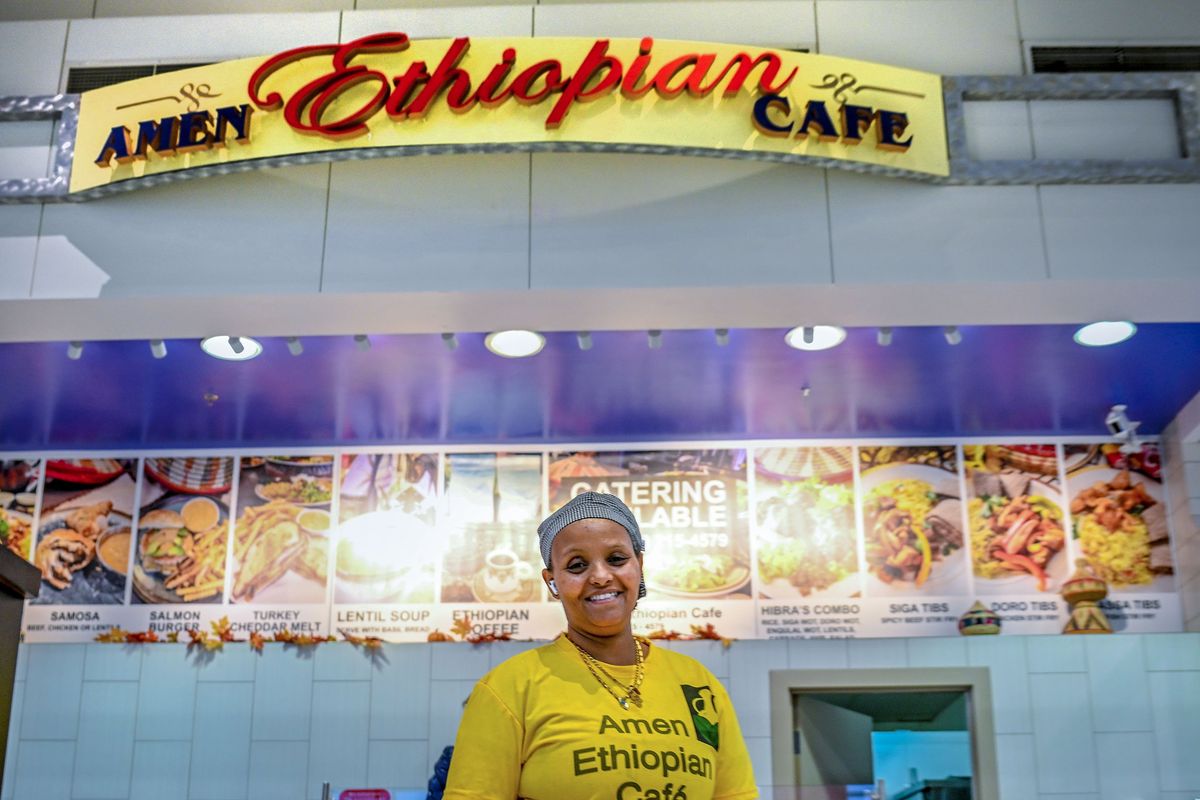Amen Ethiopian Café offers a taste of eastern Africa at the Spokane Valley Mall

When you think of mall food courts, exotic menus usually don’t come to mind, but a new restaurant at the Spokane Valley Mall has upped the ante on flavor.
This summer, chef Hibra Tsegay opened Amen Ethiopian Café at the second-floor food court. On Veteran’s Day, just after their 11 a.m. opening, a line snaked along the counter.
The heady aroma of cardamom, cumin and garlic wafted from trays of piping-hot stews and vegetables.
Originally from Ethiopia, Tsegay and her family lived in California for 22 years before moving to Spokane in 2019.
“When we moved here, I cooked once a month at Feast World Kitchen,” she said. “And I started catering.”
The restaurant is her dream.
“I asked God, what do you want me to do?” Tsegay recalled. “I decide to call the restaurant Amen, which means ‘Let your will be done.’ ”
While her menu seems simple, it requires hours of prep time because she makes everything from scratch.
“Our food starts with this,” she said, sliding injera from a griddle.
The flatbread, made from a small grain called teff, has a sourdoughlike flavor and a soft, spongy texture. Traditionally, it’s used to scoop up savory Ethiopian stews.
“Using your hands allows you to connect with your food,” Tsegay said.
Understanding that might be a hard sell in Western cultures, the café offers plenty of disposable silverware.
The berbere and mitmita seasoning blends are just as important as the injera.
“Berbere is made with 25 different spices,” Tsegay said. “Paprika is the base.”
Other spices include coriander, garlic and ginger.
Mitmita adds a bit more heat by including ground African bird’s eye chili peppers, Ethiopian cardamom and cloves.
Tsegay also makes her own clarified butter. It’s similar to ghee but with a richer flavor from added herbs and spices. In addition, she makes Ayib (fresh Ethiopian cheese).
Menu staples include siga wot (spicy beef stew), doro wot (chicken stew) and lentil soup.
Siga wot is the most popular dish, but Tsegay recommends the combo meal. For $17, you get generous portions of both stews, spiced rice, enqulal wot (egg stew), split peas, Ayib and vegetables served atop injera.
If you think you might have room, add an order of sambusa (puffed pastry filled with chicken, beef or vegetables).
Rich, aromatic Ethiopian coffee is available by the cup, and you can purchase a bag of whole beans to grind and enjoy at home.
For the less adventurous diner, the café offers both turkey and vegetarian cheddar melts, as well as a salmon burger. All of the sandwiches are topped with Tsegay’s Ethiopian-style Thousand Island dressing. It features her spice blend and makes a zesty dip for fries or sambusa.
The chef admits her menu is labor-intensive.
“I don’t cut corners,” she said. “I cook everything.”
That includes the basil bread, served with the lentil or chicken noodle soup.
Every Monday, she cooks 100 pounds of onions. She buys top-round roasts and grinds and seasons them herself. But all that daily work pales in comparison to how difficult it was to get her dream off the ground.
“I struggled so hard to open the restaurant,” Tsegay said. “I had to take out a $100,000 loan.”
Her two sons in high school pitch in when they can, and her husband is her anchor.
“I call him ‘Kia,’ it means ‘you’re mine,’ ” she said. “He is my biggest supporter. This isn’t his passion – it’s mine, but he believes in me, and I believe in God.”
She’s not done dreaming. Despite the struggle, she’d like to open a second location. She finds joy in sharing her culture and her food.
“Food is a universal language,” she said.
As she took a brief break at a food court table, a satisfied customer approached.
“Excuse me, I just want to let you know how much I enjoyed your food,” she said. “We’ve eaten at other Ethiopian places and this is very, very good.”
That kind of feedback makes all the long hours in the kitchen worth it for this busy chef.
“Every day, I leave with a smile on my face,” Tsegay said.
Contact Cindy Hval at dchval@juno.com.